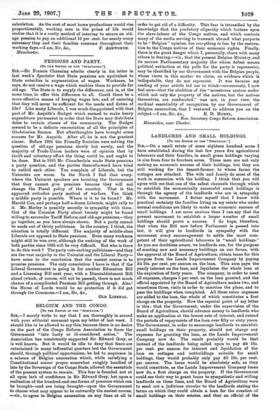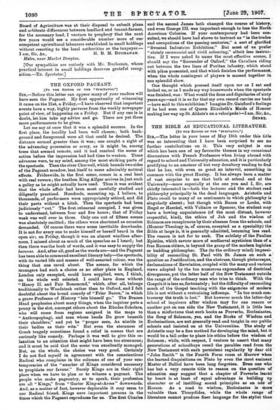LANDLORDS AND SMALL HOLDINGS.
[TO TIM EDITOR OF TEM .SPECTATOIL.1 Si,—On a small estate of some eighteen hundred acres I have established during the last few years five agricultural labourers and their families, in small grass holdings varying in size from four to fourteen acres. These men are not only making an economic success of their holdings, but they are still working for• the tenaubfarmer, to whose farms the cottages are attached. The wife and family do most of the work in connexion with the bolding. I think that you will agree with me that one of the safest channels through which to establish the economically successful small holdings is through the agency of the landlords who are in sympathy with the movement. I flatter myself that I know with practical certainty the families living on my estate who under normal conditions are likely to make an economic success of small holdings. I am more anxious than I can say that the present movement to establish a larger number of small holdings should prove a success. I do hope, therefore, that when the Bill now before Parliament is passed into law, it will give to landlords in sympathy with the movement every encouragement to settle the most com- petent of their agricultural labourers in "small holdings." As you are doubtless aware, we landlords can, for the purpose of erecting new and necessary buildings on our farms, with the approval of the Board of Agriculture, obtain loans for this purpose from the Lands Improvement Company by paying 24 16s. per cent, per annum on the loan. This sum pays the yearly interest on the loan, and liquidates the whole loan at the expiration of forty years. The company, in order to meet all expenses, charges 5 per cent, on the loan granted, and the official appointed by the Board of Agriculture makes two, and sometimes three, visits in order to sanction the plans, and to pass the buildings when completed. All these extra expenses are added to the loan, the whole of which constitutes a first charge on the property. Now the especial point of my letter is 'this: that the Government, under the supervision of the Board of Agriculture, should advance money to landlords who make an application at the lowest rate of interest, and extend the periods of repayments of the loan over fifty or sixty years. The Government, in order to encourage landlords to establish small holdings on their property, should not charge any expenses for granting the loan, as the Lands Improvement Company now do. The result probably would be that instead of the landlords being called upon to pay 24 16s. per cent, per annum for interest and liquidation of the loan on cottages and outbuildings suitable for small holdings, they would probably only pay RS 16s. per cent. per annum. The loans would be absolutely safe, as they would constitute, as the Lands Improvement Company loans now do, a first charge on the property. If the Government could see their way to grant loans to sympathetic and willing landlords on these lines, and the Board of Agriculture were to send out a judicions circular to the landlords stating the terms on which they could obtain a loan for the creation of small holdings on their estates, and that an official of the
Board of Agriculture was at their disposal to submit plans and arbitrate differences between landlord and tenant-farmer, for the necessary land, I venture to prophesy that the next few years would see a considerable number more of our competent agricultural labourers established in small holdings without resorting to the local authorities or the taxpayer.— [Our sympathies are entirely with Mr. Buchanan, whose practical interest in small holdings deserves grateful recog- nition.—En. Spectator.]

















































 Previous page
Previous page